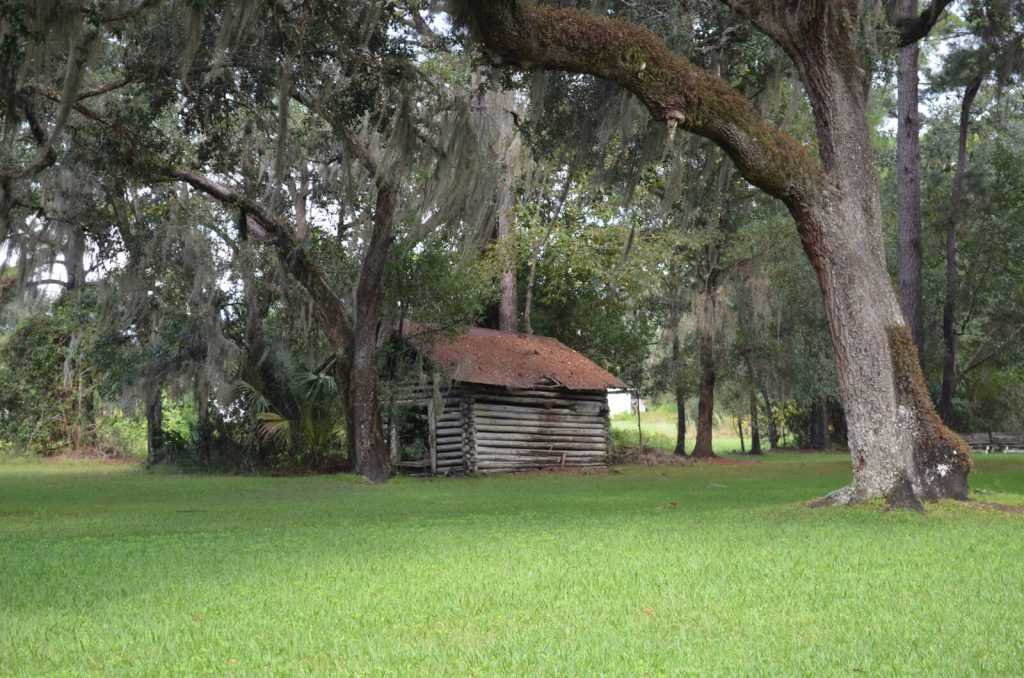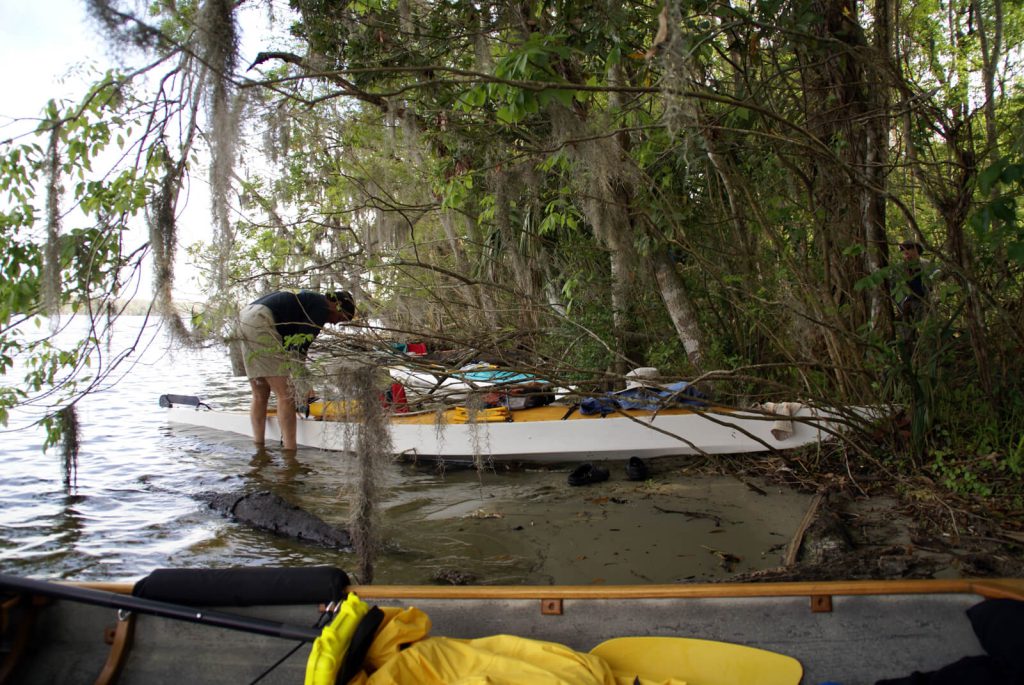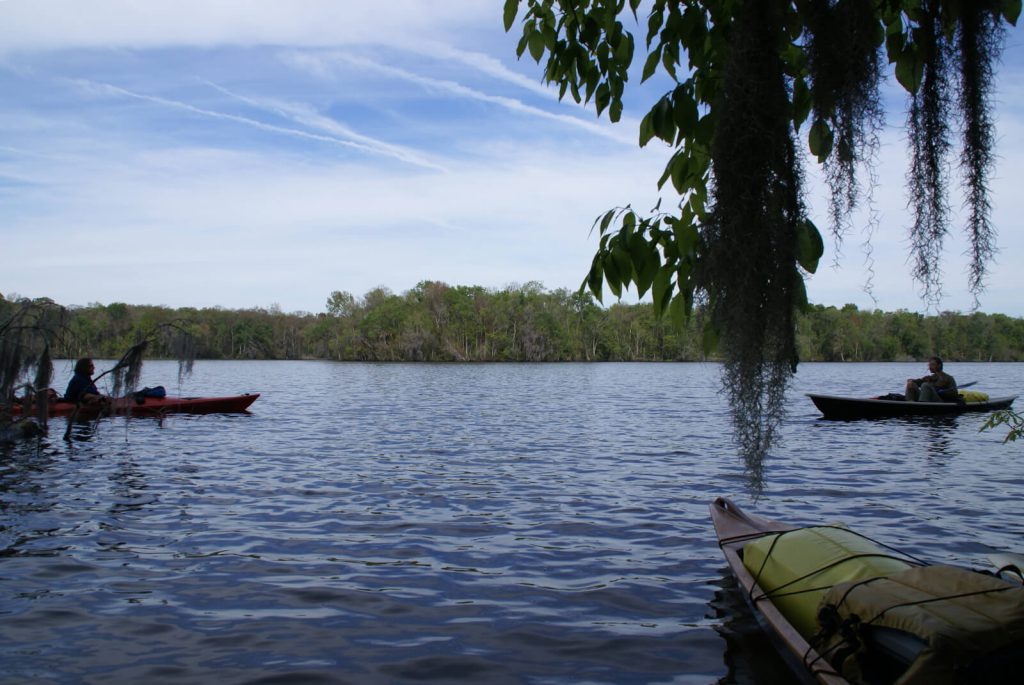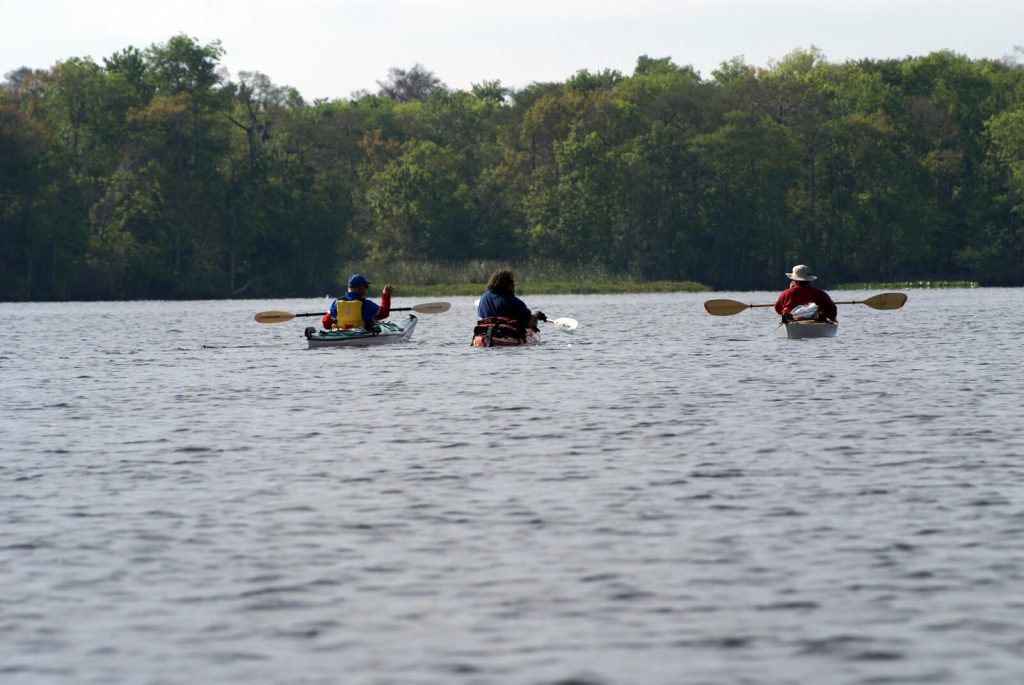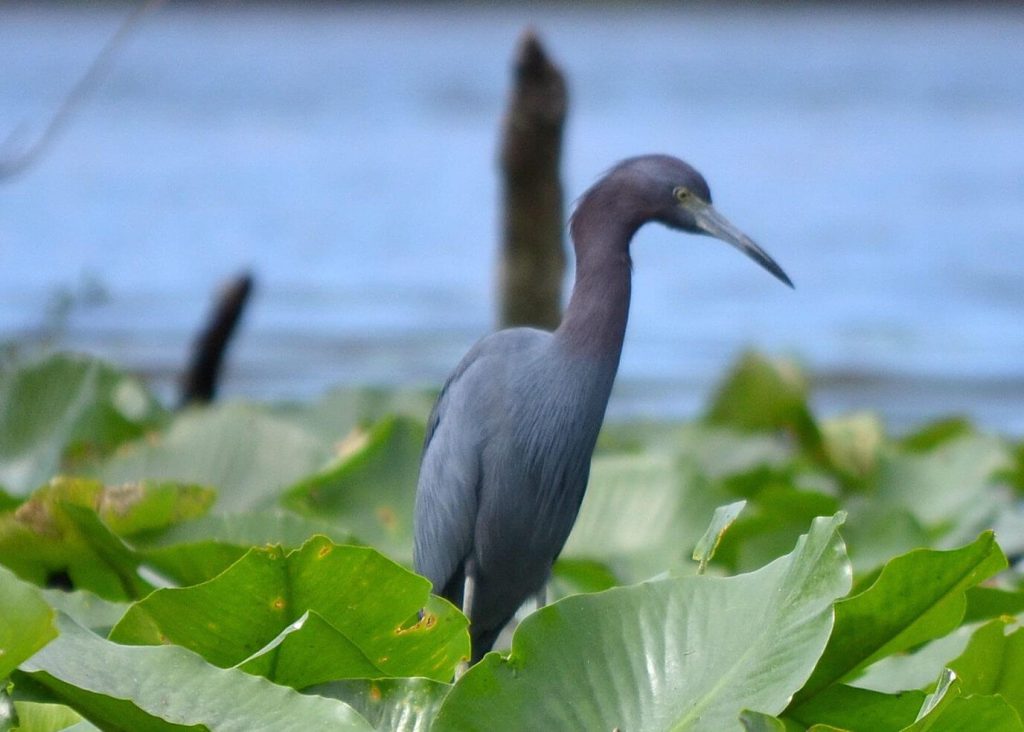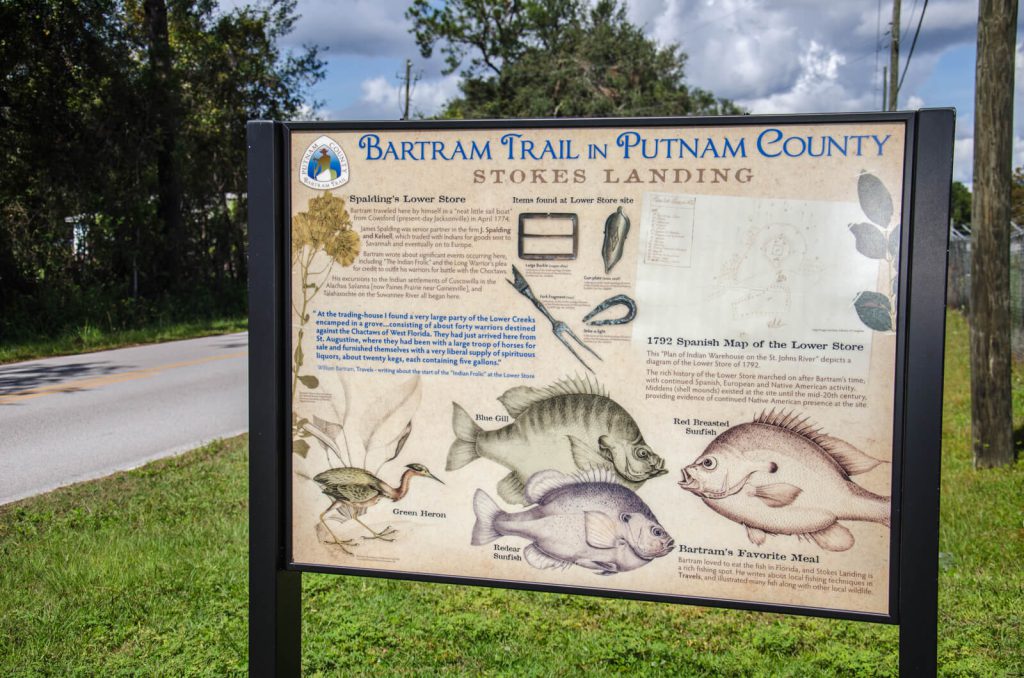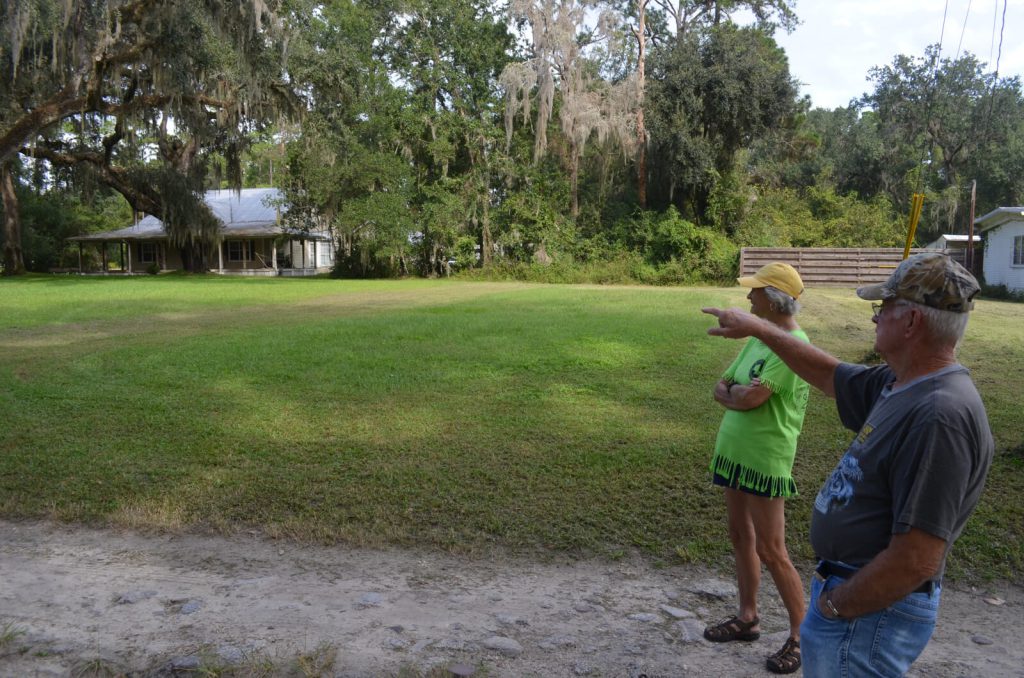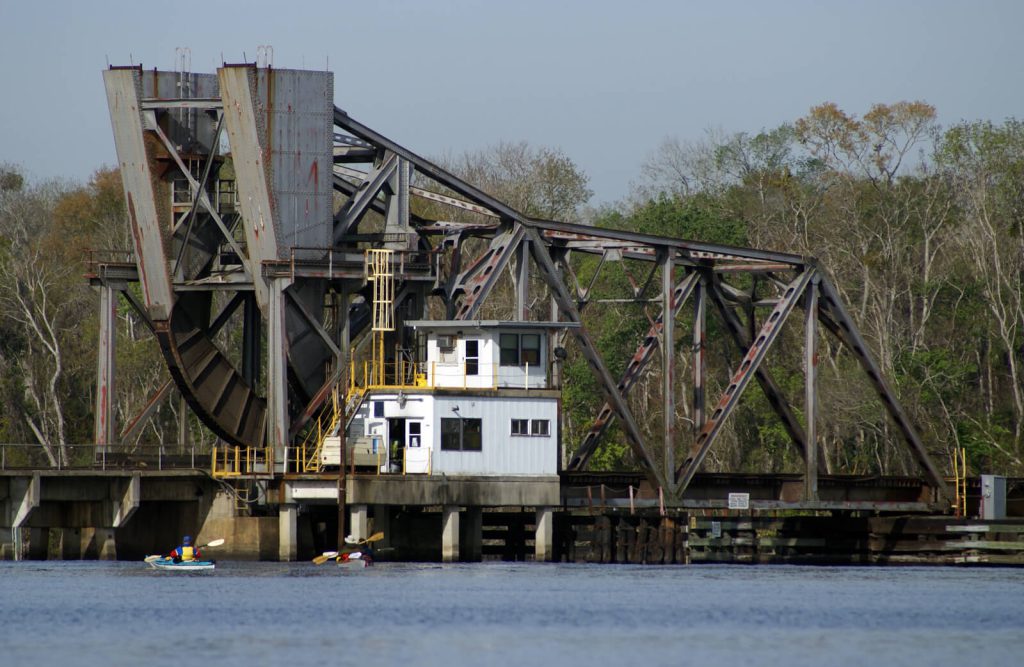13 Stokes Landing (Spalding’s Lower Store)
Putnam County
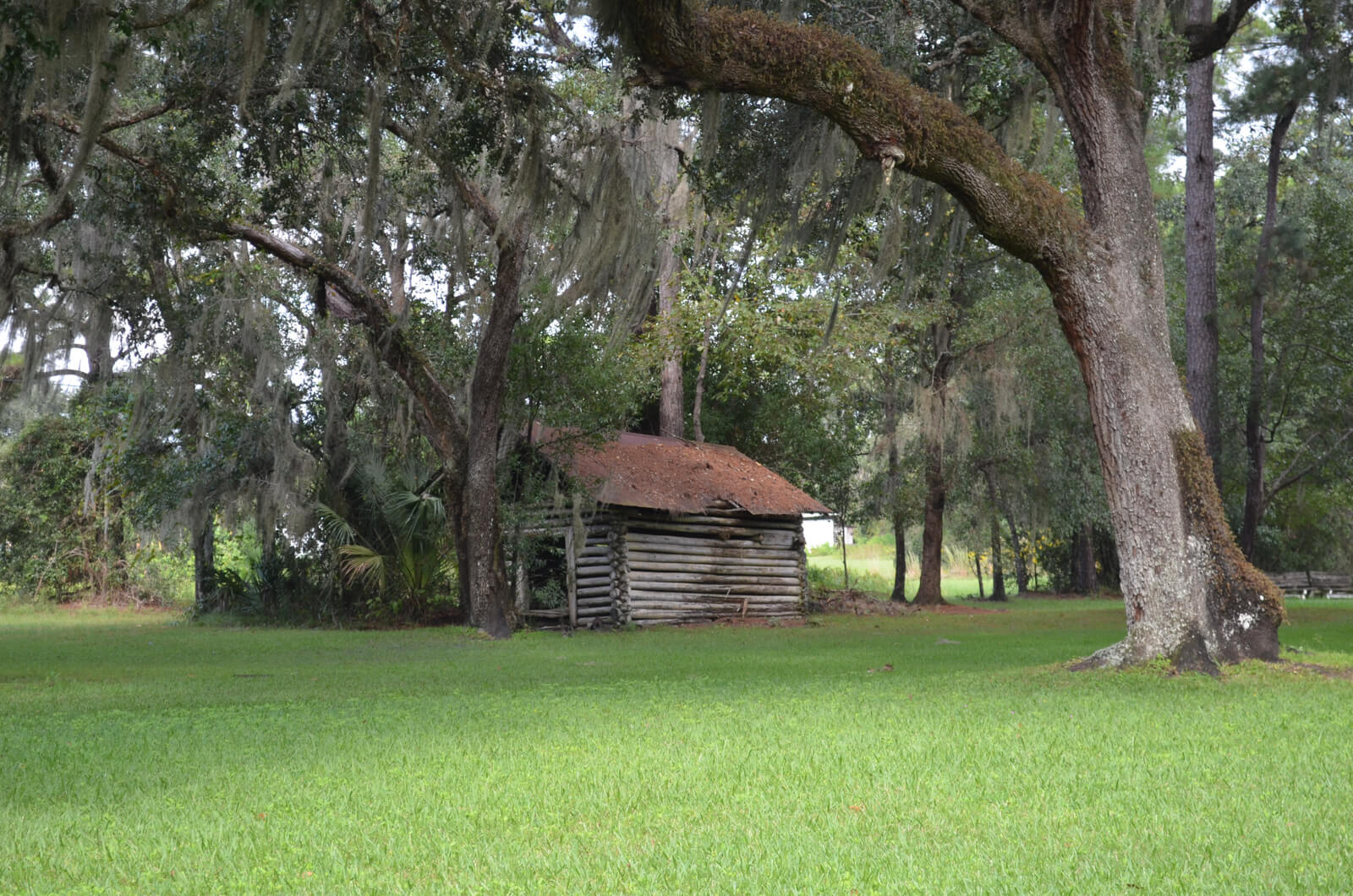

…in a little time, arrived at the trading-house, where I was received with great politeness, and treated during a residence of several months, with the utmost civility and friendship, by Mr. C. M’Latche…
John and William Bartram
The Route
On December 26, 1765, John Bartram’s party, having camped at Squire Roll’s village in present-day East Palatka, boarded their vessel and headed up river. Along the way, they stopped briefly at Murphy Island which they explored before returning to the River for the four mile journey to their next campsite at Spalding’s Lower Store. The store was situated on the banks of the River opposite a small island on the Indian or west shore of the St. Johns. The route most likely followed the east shoreline of the mainstem of the river until they reached present day Buffalo Bluff (train crossing) (Figure 1). As can be seen from the 1908 navigation map in Figure 2, there are numerous smaller creeks or channels around Murphy Island and Seven Sisters Islands the group may have taken as they approached Stokes Landing.
After spending the night here, they departed the next morning and, after rowing only a few more miles upstream, went ashore at present-day Saratoga Harbor, which John Bartram called Johnson’s Spring. They left their battoe and hiked, most likely not too far distant from the shoreline, to Welaka Spring, just north of present-day Welaka. They returned to their vessel and proceeded by water back to Johnson’s Bluff where they established their camp – probably in close proximity to Welaka Spring which was the terminus of their hike.
The Bartrams returned to the Lower Store a month later, on January 25, 1766, having explored the River as far south as Puzzle Lake east of present-day Titusville. They had spent the night on Drayton Island and, after making a lengthy stop at Mount Royal, proceeded down the River to the Store. The following morning, they left the Store for a side trip past Murphy Island and up Dunns Creek to Crescent Lake where they camped on the night of the 26th.
The Site
Bartram’s party landed at Spalding’s Lower Store located at present-day Stokes Landing (Figure 3). They made camp on a bluff underneath some pine trees opposite Stokes Island. Unlike many of the stops they made along the River, they seem to have spent little or no time surveying the surrounding countryside as no mention the soil characteristics or vegetation around the Store is made in the Journal entries for this first visit. The Journal does contain descriptions of other areas more distant that were accessible from the Store but the information was obviously obtained second-hand from the traders and others they encountered and talked with at the Store.
On the return trip a month later, the Bartrams stopped again and established camp at the Store. This time, before departing on January 27, 1766, they spent some time exploring the site around the Store. John made some observations regarding a dug well at the site and some characteristics of some recently felled pine trees near the Store.
John Bartram’s Journal makes little mention of the Store and its importance to the area. Whether this topic was merely outside of the scope of his Journal or because the Store had not yet ascended to its later preeminence is difficult to say. However, by the time of William’s subsequent visit nearly ten years later, the Store was the hub of travel and commerce among and between Europeans and Native Americans throughout the region.
William Bartram
The Route
William Bartram left Rollestown and made a brief stop at Murphy Island, four miles distant from Spalding’s Lower Store where he discovered his chest of supplies which he had shipped ahead and were now secreted on the Island. He then continued up the River, past Buffalo Bluff and Seven Sisters Islands to Stokes Landing, the site of Spalding’s Lower Store.
William ventured out from the Store in all directions, both on foot and by boat. His Travels and Report describe the various journeys in great detail, though they differ in the sequence of the events. It is presumed that the Report presents a more accurate account of the timing and that in this regard, Travels suffered at the hands of its editors who combined the accounts of some trips in order to improve the “flow” of the book for its readers.
The Florida Museum of Natural History website provides an excellent and concise compilation of the various routes taken and locations visited by William Bartram as presented in his Travels. A link to the relevant web page is provided under Resources and Links.
The Site
Spalding’s Lower Store is undoubtedly the most important of all the Bartram Sites in Putnam County and, in fact, of all of the St. Johns River sites visited by William Bartram. He made numerous visits to the Store and developed a close friendship with the Store director with whom he traveled extensively during his visits. Both of his publications contain descriptions of the Store and the characters he encountered here and his accounts paint a vivid picture of life in frontier Florida (Figure 4).
The site of the Lower Store was the subject of an archeological dig performed by the University of Florida during the mid-1900s and artifacts and records of the dig can be seen at the Florida Museum in Gainesville. Photographs of the exhibit and some of the artifacts recovered during the excavation are shown in Figure 5 below.
Bartram Trail Marker 13 is located on private property on the shoreline of the River opposite Stokes Island. Because the road leading to the site provides limited access reserved for the few residents living near this site, it can only be viewed from the water. There is a Bartram Trail Kiosk located on Stokes Landing Road a short distance from the location of the Store and it can be reached only by land (Figure 6).
William Bartrams Travels May 1774 – Chapter IV
Page 96
HAVING obtained from the people here, directions for discovering the little remote island, where the traders and their goods were secreted, which was about seven miles higher up, I sat sail again, with a fair wind, and in about one hour and an half, arrived at the desired place, having fortunately taken the right channel of the river, amongst a multitude of others, occasioned by a number of low swampy islands. But I should have ran by the landing, if the centinels had not, by chance seen me drawing near them; and who perceiving that I was a whiteman, ventured to hail me; upon which I immediately struck sail, and came too. Upon my landing they conducted me to their encampment, forty or fifty yards from the river, in an almost impenetrable thicket. Upon my inquiry, they confirmed the accounts of the amicable treaty at St. Augustine, and in consequence thereof, they had already removed great part of the goods, to the trading-house, which was a few miles higher up, on the Indian shore. They shewed me my chest, which had been carefully preserved, and upon inspection I found every thing in good order. Having learned from them, that all the effects would, in a few days time, be removed to the store-house, I bid adieu to them, and in a little time, arrived at the trading-house, where I was received with great politeness, and treated during a residence of several months, with the utmost civility and friendship, by Mr. C. M’Latche, Messrs. Spalding and Kelsall’s agent.
CHAP. IV.
HAVING rested myself a few days, and by ranging about the neighbouring plains and groves, surrounding this pleasant place, pretty well recovered my strength and spirits, I began to think of planning my future excursions, at a distance round about this center. I found from frequent conferrences with Mr. M’Latche, that I might with safety, extend my journeys every way, and with prudence, even into the towns and settlement of the Indians, as they were perfectly reconciled to us, and sincerely wished for the renewal of our trade.
THERE were three trading-houses to be established this summer, each of which had its supplier from the store on St. Juan, where I now had my residence, and in which the produce or returns were to center annually, in order to be shipped for Savanna or Sunbury, and from thence to Europe.
ONE of these trading-houses was to be fixed about sixty miles higher up the river, from this place, by the name of Spalding’s upper store; a second at Alachua, about fifty miles West from the river St. Juan; and a third at Talahasochte, a considerable town of the Siminoles, on the river Little St. Juan, near the bay of Apalachi, about one hundred and twenty miles distance. Each of these places I designed to visit, before the return of the vessel to Frederica, in the autumn, that I might avail myself of an opportunity so favourable, for transporting my collections so far on their way towards Charleston.
Page 98
THE company for Alachua, were to set off in about a month. That to Little St. Juan, in July, which suited me exceedingly well, as I might make my tour to the upper store directly, that part of the country being at this season, enrobed in her richest and gayest apparel.
ABOUT the middle of May, every thing being in readiness, to proceed up the river, we sat sail. The traders with their goods in a large boat, went ahead, and myself in my little vessel followed them; and as their boat was large, and deeply laden, I found that I could easily keep up with them, and if I chose, out-sail them; but I preferred keeping them company, as well for the sake of collecting what I could from conversation, as on account of my safety in crossing the great lake, expecting to return alone, and descend the river at my own leisure.
WE had a pleasant day, the wind fair and moderate, and ran by Mount Hope, so named by my father John Bartram, when he ascended this river, about fifteen years ago. It is a very high shelly bluff, upon the little lake. It was at that time a fine Orange grove, but now cleared and converted into a large Indigo plantation, the property of an English gentleman, under the care of an agent. In the evening we arrived at Mount Royal, where we came to, and stayed all night: we were treated with great civility, by a gentleman whose name was—- Kean, and had been an Indian trader.
Page 169
Arose early next morning, and after ranging the groves and savannas, returned, embarked again, and descending, called at Mount Royal, where I enlarged my collections; and bidding adieu to the gentleman and lady, who resided here, and who treated me with great hospitality on my ascent up the river; arrived in the evening at the lower trading house.
Page 170
William Bartrams Travels May 1774 – Chapter VI – VII
CHAP. VI.
ON my return from my voyage to the upper store, I understood the trading company designed for Cuscowilla, that they had been very active in their preparations, and would be ready to set off in a few days; I therefore availed myself of the little time allowed me to secure and preserve my collections, against the arrival of the trading schooner, which was hourly expected, that every thing might be in readiness to be shipped on board her, in case she should load again and return for Savanna during my absence.
EVERY necessary being now in readiness, early on a fine morning we proceeded, attended by four men under the conduct of an old trader, whom Mr. M’Latche had delegated to treat with the Cowkeeper and other chiefs of Cuscowilla, on the subject of re-establishing the trade, &c. agreeable to the late treaty of St. Augustine.
Page 215
CHAP. VII.
A JOURNEY FROM SPALDING’S LOWER TRADING HOUSE TO TALAHASOCHTE OR WHITE KING’S TOWN, ON THE RIVER LITTLE ST. JUAN, THIRTY MILES ABOVE FORT ST. MARKS IN THE BAY OF APALATCHE.
ON my return to the trading house, from my journey to the great savanna, I found the trading company for Little St. Juan’s, were preparing for that post.
MY mind yet elate with the various scenes of rural nature, which as a lively animated picture, had been presented to my view; the deeply engraven impression, a pleasing flattering contemplation, gave strength and agility to my steps, anxiously to press forward to the delightful fields and groves of Apalatche.
THE trading company for Talahasochte being now in readiness to proceed for that quarter, under the direction of our chief trader, in the cool of the morning we sat off, each of us having a good horse to ride, besides having in our caravan several pack horses laden with provisions, camp equipage and other necessaries; a young man from St. Augustine, in the service of the governor of East Florida accompanied us, commissioned to purchase of the Indians and traders, some Siminole horses.
Page 251
WE sat off early next morning, and soon after falling into the trading path, accomplished about twenty miles of our journey, and in the evening encamped as usual, near the banks of savannas and ponds, for the benefit of water and accommodations of pasture for our creatures. Next day we passed over part of the great and beautiful Alachua Savanna, whose exuberant green meadows, with the fertile hills which immediately encircle it, would if peopled and cultivated after the manner of the civilized countries of Europe, without crouding or incommoding families, at a moderate estimation, accommodate in the happiest manner, above one hundred thousand human inhabitants, besides millions of domestic animals; and I make no doubt this place will at some future day be one of the most populous and delightful seats on earth.
WE came to camp in the evening, on the banks of a creek but a few miles distance from Cuscowilla, and two days more moderate travelling brought us safe back again to the lower trading-house, on St. Juan, having been blessed with health and prosperous journey.
ON my arrival at the stores, I was happy to find all well as we had left them, and our bringing with us friendly talks from the Siminole towns, and the Nation likewise, compleated the hopes and wishes of the trading company, with respect to their commercial concerns with the Indians, which, as the chearing light of the sun-beams after a dark, tempestuous night, diffused joy and conviviality throughout the little community, where were a number of men with their families, who had been put out of employment and subsistence, anxiously waiting the happy event.
Page 252
William Bartrams Travels May 1774 – Chapter VIII
CHAP. VIII.
AS a loading could not be procured until late in the autumn, for the schooner that was to return to Georgia, this circumstance allowed me time and opportunity to continue my excursions in this land of flowers, as well as at the same time to augment my collections of seeds, growing roots, &c.
I RESOLVED upon another little voyage up the river; and after resting a few days and refitting my bark, I got on board the necessary stores, and furnishing myself with boxes to plant roots in, with my fuzee, amunition and fishing tackle, I sat sail, and in the evening arrived at Mount Royal. Next morning being moderately calm and serene, I sat sail with a gentle leading breeze, which delightfully wafted me across the lake to the west coast, landing on an airy, sandy beach, a pleasant, cool situation, where I passed the night, but not without frequent attacks from the musquitoes, and next day visited the Great Springs, where I remained until the succeeding day, encreasing my collections of specimens, seeds and roots, and then recrossed the lake to the Eastern coast. This shore is generally bolder and more rocky than the Western, it being exposed to the lash of the surf, occasioned by the W. and N. W. winds, which are brisk and constant from nine or ten o’clock in the morning till towards midnight, almost the year round; though the S. winds are considerable in the spring, and by short intervals during the summer and winter; and the N. E. though sometimes very violent in the spring
Page 253
and autumn, does not continue long. The day was employed in coasting slowly, and making collections. In the evening I made a harbour under cover of a long point of flat rocks, which defended the mole from the surf; having safely moored my bark, and chosen my camping ground just by, during the fine evening I reconnoitred the adjacent groves and lawns; here is a deserted plantation, the property of Dr. Stork, where he once resided. I observed many lovely shrubs and plants in the old fields and Orange groves, particularly several species of Convolvulus and Ipomea, the former having very large, white, sweet scented flowers; they are great ramblers, climbing and strolling on the shrubs and hedges. Next morning I re-embarked and continued traversing the bold coast North-Eastward, and searching the shores at all convenient landings, where I was amply rewarded for my assiduity in the society of beauties in the blooming realms of Florida. Came to again, at an old deserted plantation, the property of a British gentleman, but some years since vacated. A very spacious frame building was settling to the ground and mouldering to earth; here are very extensive old fields, where were growing the West-Indian or perennial Cotton and Indigo, which had been cultivated here, and some scattered remains of the ancient Orange groves, which had been left standing at the clearing of the plantation.
I HAVE often been affected with extreme regret, at beholding the destruction and devastation which has been committed, or indiscreetly exercised on those extensive, fruitful Orange groves, on the banks of St. Juan, by the new planters under the British government, some hundred acres of which, at a
Page 254
single plantation, has been entirely destroyed to make room for the Indigo, Cotton, Corn, Batatas, &c. or as they say to extirpate the musquitoes, alledging that groves near their dwellings are haunts and shelters for those persecuting insects; some plantations have not a single tree standing, and where any have been left, it is only a small coppice or clump, nakedly exposed and destitute; perhaps fifty or an hundred trees standing near the dwelling-house, having no lofty cool grove of expensive Live Oaks, Laurel Magnolias and Palms to shade and protect them, exhibiting a mournful, sallow countenance; their native perfectly formed and glossy green foliage as if violated, defaced and torn to pieces by the bleak winds, scorched by the burning sun-beams in summer, and chilled by the winter frosts.
IN the evening I took up my quarters in the beautiful isle in sight of Mount Royal. Next day, after collecting what was new and worthy of particular notice, I sat sail again and called by the way at Mount Royal, in the evening arrived safe at the stores, bringing along with me valuable collections.
Page 255
William Bartrams Travels May 1774 – Chapter IX
CHAP. IX.
AT the trading-house I found a very large party of the Lower Creeks encamped in a grove, just without the pallisadoes; this was a predatory band of the Siminoles, consisting of about forty warriors destined against the Chactaws of West Florida. They had just arrived here from St. Augustine, where they had been with a large troop of horses for sale and furnished themselves with a very liberal supply of spirituous liquors, about twenty kegs, each containing five gallons.
THESE sons of Mars had the continence and fortitude to withstand the temptation of even tasting a drop of it until their arrival here, where they purposed to supply themselves with necessary articles to equip them for the expedition, and proceed on directly; but here meeting with our young traders and pack-horse men, they were soon prevailed on to broach their beloved nectar; which in the end caused some disturbance, and the consumption of most of their liquor, for after they had once got a smack of it, they never were sober for ten days, and by that time there was but little left.
IN a few days this festival exhibited one of the most ludicrous bachanalian scenes that is possible to be conceived, white and red men and women without distinction, passed the day merrily with these jovial, amorous topers, and the nights in convivial songs, dances and sacrifices to Venus, as long as they could stand or move; for in these frolicks both sexes take those liberties with each other, and
Page 256
act, without constraint or shame, such scenes as they would abhor when sober or in their senses; and would endanger their ears and even their lives; but at last their liquor running low, and being most of them sick through intoxication, they became more sober, and now the dejected lifeless sots would pawn every thing they were in possession of, for a mouthful of spirits to settle their stomachs, as they termed it. This was the time for the wenches to make their market, as they had the fortitude and subtilty by dissimulation and artifice to save their share of the liquor during the frolick, and that by a very singular stratagem, for, at these riots, every fellow who joins in the club, has his own quart bottle of rum in his hand, holding it by the neck so sure that he never looses hold of it day or night, drunk or sober, as long as the frolick continues, and with this, his beloved friend, he roves about continually, singing, roaring and reeling to and fro, either alone or arm in arm with a brother toper, presenting his bottle to every one, offering a drink, and is sure to meet his beloved female if he can, whom he complaisantly begs to drink with him, but the modest fair, veiling her face in a mantle, refuses (at the beginning of the frolick) but he presses and at last insists; she being furnished with an empty bottle, concealed in her mantle, at last consents, and taking a good long draught, blushes, drops her pretty face on her bosom and artfully discharge the rum into her bottle, and by repeating this artifice soon fills it; this she privately conveys to her secret store, and then returns to the jovial game, and so on during the festival; and when the comic farce is over, the wench retails this precious cordial to them at her own price.
Page 257
THERE were a few of the chiefs, particularly the Long Warrior their leader, who had the prudence and fortitude to resist the alluring temptation during the whole farce; but though he was a powerful chief, a king and a very cunning man, he was not able to controul these madmen, although he was acknowledged by the Indians to have communion with powerful invisible beings or spirits, and on that account esteemed worthy of homage and great respect.
AFTER the Indians became sober they began to prepare for their departure; in the morning early the Long Warrior and chiefs sent a messenger to Mr. M’Latche, desiring to have a talk with him upon matters of moment; accordingly about noon they arrived; the conference was held in the piazza of the council house; the Long Warrior and chiefs who attended him, took their seats upon a long bench adjoining the side or front of the house, reaching the whole length of it, on one hand; and the principal white traders on the other, all on the same seat; I was admitted at this conference, Mr. M`Latche and the Long Warrior sat next to each other, my late companion, the old trader and myself sat next to him.
THE Long Warrior spake, saying, that he and his companions were going to fight their enemies the Chactaws, and that some of his associates being in want of blankets, shirts and some other articles, which they declined supplying themselves with at St. Augustine, because they had rather stick close to their old friend Mr. Spalding, and bring their buckskins, furs and other produce of their country to his trading house, (which they knew
Page 258
were acceptable) to purchase what they wanted; But not having the skins, &c. with them to pay for such things as they had occasion for, yet doubted not, but that on their return, they should bring with them sufficient not only to pay their debts, about to be contracted, but be able to make other considerable purchases, as the principal object of this expedition was hunting on the plentiful borders of the Chactaws. Mr. M’Latche hesitating, and expressing some dissatisfaction at his request; particularly at the length of time and great uncertainty of obtaining pay for the goods, and moreover his being only an agent for Messrs. Spalding & Co. and the magnitude and unprecedented terms of the Long Warrior’s demands, required the company’s assent and directions before he could comply with their request.
THIS answer displeased the Indian chief, and I observed great agitation and tumult in his passions, from his actions, hurry and rapidity of speech and expression; the old interpreter who sat by asked me if I fully understood the debate, I answered that I apprehended the Long Warrior was displeased, he told me he was so, and then recapitulated what has been said respecting his questions and Mr. M’Latche’s answer; adding that upon his hesitation he immediately replied, in seeming disgust and great expressions of anger, “Do you presume to refuse me credit; certainly you know who I am and what power I have; but perhaps you do not know that if the matter required it, and I pleased, that I could command and cause the terrible thunder*
* It thundered, lightened and rained in a violent manner during these debates.
now rolling in the skies above, to descend
Page 259
upon your head, in rapid fiery shafts, and lay you prostrate at my feet, and consume your stores, turning them instantly into dust and ashes.” Mr. M’Latche calmly replied, that he was fully sensible that the Long Warrior was a great man, a powerful chief of the bands of the respectable Siminoles, that his name was terrible to his enemies, but still he doubted if any man upon earth had such power, but rather believed that thunder and lightning was under the direction of the Great Spirit, but however, since we are not disposed to deny your power, supernatural influence and intercourse with the elements and spiritual agents, or withhold the respect and homage due to so great a prince of the Siminoles, friends and allies to the white people; if you think fit now in the presence of us all here, command and cause yon terrible thunder with its rapid fiery shafts, to descend upon the top of that Live Oak*
* A large ancient Live Oak stood in the yard about fifty yards distant.
in front of us, rend it in pieces, scatter his brawny limbs on the earth and consume them to ashes before our eyes, we will then own your supernatural power and dread your displeasure.
AFTER some silence the prince became more calm and easy, and returned for answer, that recollecting the former friendship and good understanding, which had ever subsisted betwixt the white people and red people of the Siminole bands, and in particular, the many acts of friendship and kindness received from Mr. M’Latche, he would look over this affront; he acknowledged his reasoning and expostulations to be just and manly, that he should suppress his resentment, and withhold his power and vengeance at present. Mr. M’Latche concluded, by saying that he was not
Page 260
in the least intimidated by his threats of destroying him with thunder and lightning, neither was he disposed in any manner to displease the Siminoles, and should certainly comply with his requisitions, as far as he could proceed without the advice and directions of the company, and finally agreed to supply him and his followers with such things as they stood most in need of, such as shirts, blankets and some paints, one half to be paid for directly, and the remainder to stand on credit until their return from the expedition. This determination entirely satisfied the Indians. We broke up the conference in perfect amity and good humour, and they returned to their camp and in the evening, ratified it with feasting and dancing, which continued all next day with tolerable decorum. An occurrence happened this day, by which I had an opportunity of observing their extraordinary veneration or dread of the rattle snake; I was in the forenoon busy in my apartment in the council-house, drawing some curious flowers; when, on a sudden, my attention was taken off by a tumult without, at the Indian camp; I stepped to the door opening to the piazza, where I met my friend the old interpreter, who informed me that there was a very large rattle snake in the Indian camp, which had taken possession of it, having driven the men, women and children out, and he heard them saying that they would send for Puc-Puggy (for that was the name which they had given me, signifying the Flower Hunter) to kill him or take him out of their camp; I answered that I desired to have nothing to do with him, apprehending some disagreeable consequences, and desired that the Indians might be acquainted that I was engaged in business that required application and quiet, and was determined to avoid it if
Page 261
possible; my old friend turned about to carry my answer to the Indians, I presently heard them approaching and calling for Puc-Puggy; starting up to escape from their sight by a back door, a party consisting of three young fellows, richly dressed and ornamented, stepped in, and with a countenance and action of noble simplicity, amity and complaisance, requested me to accompany them to their encampment; I desired them to excuse me at this time; they plead and entreated me to go with them, in order to free them from a great rattle snake which had entered their camp, that none of them had freedom or courage to expel him, and understanding that it was my pleasure to collect all their animals and other natural productions of their land, desired that I would come with them and take him away, that I was welcome to him. I at length consented and attended on them to their encampment, where I beheld the Indians greatly disturbed indeed. The men with sticks and tomahawks, and the women and children collected together at a distance in affright and trepidation, whilst the dreaded and revered serpent leisurely traversed their camp, visiting the fire places from one to another, picking up fragments of their provisions and licking their platters. The men gathered around me, exciting me to remove him: being armed with a lightwood knot, I approached the reptile, who instantly collected himself in a vast coil (their attitude of defence) I cast my missile weapon at him, which luckily taking his head, dispatched him instantly, and laid him trembling at my feet; I took out my knife, severed his head from his body, then turning about, the Indians complimented me with every demonstration of satisfaction and approbation for my heroism, and friendship for them. I carried off
Page 262
the head of the serpent bleeding in my hand as a trophy of victory, and taking out the mortal fangs, deposited them carefully amongst my collection. I had not been long retired to my apartment before I was again roused from it by a tumult in the yard, and hearing Puc-Puggy called on, I started up, when instantly the old interpreter met me again, and told me the Indians were approaching in order to scratch me; I asked him for what; he answer for killing the rattle snake within their camp. Before I could make any reply or effect my escape, three young fellows singing, arm in arm, came up to me; I observed one of the there was a young prince who had, on my first interview with him, declared himself my friend and protector, when he told me that if ever occasion should offer in his presence, he would risk his life to defend mine or my property. This young champion stood by his two associates, one on each side of him, the two affecting a countenance and air of displeasure and importance, instantly presenting their scratching instruments, and flourishing them, spoke boldly, and said that I was too heroic and violent, that it would be good for me to loose some of my blood to make me more mild and tame, and for that purpose they were come to scratch me; they gave me no time to expostulate or reply, but attempted to lay hold on me, which I resisted, and my friend, the young prince, interposed and pushed them off, saying that I was a brave warrior and his friend, that they should not insult me, when instantly they altered their countenance and behaviour; they all whooped in chorus, took me friendly by the hand, clapped me on the shoulder and laid their hands on their breasts in token of sincere friendship, and laughing aloud, said I was a sincere friend to the Siminoles,
Page 263
a worthy and brave warrior, and that no one should hereafter attempt to injure me: they then all three joined arm in arm again and went off, shouting and proclaiming Puc-Puggy was their friend, &c. Thus it seemed that the whole was a ludicrous farce to satisfy their people and appease the manes*
* These people never kill the rattle snake or any other serpent, saying if they do so, the spirit of the killed snake will excite or influence his living kindred or relatives to revenge the injury or violence done to him when alive.
of the slain rattle snake.
THE next day was employed by the Indians in preparations for their departure, such as taking up their goods from the trading house, collecting together their horses, making up their packs, &c. and the evening joyfully spent in songs and dances. The succeeding morning after exhibiting the war farce they decamped, proceeding on their expedition against their enemy.
Page 303
William Bartrams Travels May 1774 – Chapter XI
FTER the predatory band of Siminoles, under the conduct of the Long Warrior, had decamped, Mr. M’Latche invited me with him on a visit to an Indian town, about twelve miles distance from the trading-house, to regale ourselves at a feast of Water mellons and Oranges, the Indians having brought a canoe load of them to the trading-house the day preceding, which they disposed of to the traders. This was a circumstance pretty extraordinary to me, it being late in September, a season of the year when the Citruel are ripe and gone in Georgia and Carolina, but here the weather yet continued hot and sultry, and consequently this cool, exhilerating fruit was still in high relish and estimation.
AFTER breakfasting, having each of us a Siminole horse completely equipped, we sat off: the ride was agreeable and variously entertaining; we kept no road or pathway constantly, but as Indian hunting tracks, by chance suited our course, through high, open Pine forests, green lawns and flowery savannas in youthful verdure and gaity, having been lately burnt, but now overrun with a green enamelled carpet, checquered with hommocks of trees of dark green foliage, intersected with serpentine rivulets, their banks adorned with shrubberies of various tribes, as Andromeda fomosissima, And. nitida, And. virides, And. calyculata, And. axilaris, Halmea spuria, Annona alba, &c. About noon we arrived at the town, the same little village
Page 304
I passed by on my ascent of the river, on the banks of the little lake below Charlotia.
WE were received and entertained friendly by the Indians, the chief of the village conducting us to a grand, airy pavilion in the center of the village. It was four square; a range of pillars or posts on each side supporting a canopy composed of Palmetto leaves, woven or thatched together, which shaded a level platform in the center that was ascended to from each side, by two steps or flights, each about twelve inches high, and seven or eight feet in breadth, all covered with carpets or matts, curiously woven of split canes dyed of various colours; here being seated or reclining ourselves, after smoking tobacco, baskets of choicest fruits were brought and set before us.
THE fields surrounding the town and groves were plentifully stored with Corn, Citruels, Pumpkins, Squashes, Beans, Peas, Potatoes, Peaches, Figs, Oranges, &c.
TOWARDS evening we took our leave, and arrived at the stores before night, having in the course of the day collected a variety of curious specimens of vegetables, seeds and roots.
THE company being busily employed in forming their packs of leather and loading the vessel, and I being eager to augment my collections during my stay here, I crossed the river with a party of our people, who were transporting a gang of horses to range in the meadows and plains on the side opposite to the trading-house we carried them over in a large flat or scow. The river was here above a mile wide, but divided into a number of streams by
Page 305
numerous islands, which occasioned the voyage to be very troublesome, as most of the horses were lately taken wild out of their ranges, and many of them young and untutored; being under the necessity of passing near the points of the islands, they grew restless and impatient to land, and it was with great difficulty we kept them on board, and at last when within a quarter of a mile of the opposite shore, passing between two islands, the horses became ungovernable, and most of them plunged into the river and forced over board one of our people; I being a pretty good swimmer, in the midst of the bustle, and to avoid being beat over and perhaps wounded, I leapt out and caught hold of the dock of one of the horses; we all landed safe on one of the islands, about one hundred and fifty yards distance, and the flat followed us: after a deal of trouble and loss of time we got the horses again into the scow, where securing them by withs and vines, we again sat off, and soon landed safe on the main, at a high bluff or bank of the river, where, after turning the horses to pasture and resting ourselves, we sat off on a visit to a plantation on the river, six or eight miles distance: on the way thither we discovered a bee tree, which we cut down and regaled ourselves on the delicious honey; leaving one of our companions to protect the remainder until our return with a tub, to collect it and carry it with us, and in the evening we all returned safe with our sweet booty to the trading-house.
THE vessel being loaded and ready to depart, I got all my collections on board. My trusty and fortunate bark I presented to the old interpreter, Job Wiggens, often my travelling companion, friend and
Page 306
benefactor, and taking an affectionate and final leave of the worthy C. M’Latche and the whole trading company, we sat sail in a neat little schooner for Frederica in Georgia, about the last of September. We had a pleasant and prosperous voyage down the grand river St. Juans, frequently visiting the plantations on the banks of the river, especially at such times as opposed by contrary winds, and according to promise did not neglect calling on the generous and friendly Mr. Marshall, who received me so politely, and treated me with such unparalleled friendship and hospitality, when ascending the river alone, last spring.
December 26, 1765 Journal Entry
“Thermometer temperate, fine day, wind south. Excellent swamps on both sides of the river, some 2 or 3 miles deep; landed on Dunn’s Island on a large snail shell ridge, the adjacent swamp excellent, and the middle ground rich for corn, turkeys and alligators plenty, saw a middling sized Indian tumulus, 20 yards diameter and 6 or 8 foot high; arrived soon at Spalding’s Lower-store, on the west-side of the river, 37 miles from Picolata and 50 from Latchaway, an inland Indian town, near half the way pine-land and palmetto-ground: It is generally affirmed, that the soil at Latchaway is excellent, and produceth good corn and rich pasture; we encamped on a bluff in the pine-land, over-against a rich little island.”
December 27, 1765 Journal Entry
“Thermometer 50, fine morning. Set out from the Store, and about 5 miles above, landed on a high bluff, on the east-side of the river, at Johnson’s Spring, a run of clear and sweet water, then travelled on foot along thick woody but loamy ground, looking rich on the surface by reason of the continual falling leaves, and by the constant evergreen shade rotting to soil, as the sun never shines on the ground strong enough to exhale their virtue before their dissolution, as under deciduous trees: We crossed several small rivulets of clear sweet water, and as many narrow moist swamps. ‘Tis diverting to observe the monstrous grape-vines, 8 inches in diameter, running up the oaks 6 foot in diameter, swamp-magnolia 70 foot high strait, and a foot diameter, the great magnolia very large, liquid-amber, white swamp and live oaks, chinquapines and cluster-cherry all of an uncommon size, mixed with orange-trees, either full of fruit or scattered on the ground, where the sun can hardly shine for the green leaves at Christmas, and all in a mass of white or yellow soil 16 foot more or less above the surface of the river. We came down a steep hill 20 foot high and about 4 or 500 yards from the river, under the foot of which issued out a large fountain (big enough to turn a mill) of warm clear water of a very offensive taste, and smelt like bilge-water, or the washings of a gun-barrel; the sediment that adhered to the trees fallen therein, looked of a pale white or bluish cast, like milk and water mixed: We then crossed the swamp, and ascended and descended two hills and narrow swamps more; at the foot of the last issued out another warm spring of clear water like the other, but not so large. Then travelling alternately over hills and swamps, in all about 3 or 4 miles, came to a great cove, near a quarter of a mile from the river, out of the head of which arose a prodigious large fountain of clear water of loathsome taste, like the other two before mentioned; it directly formed a large deep creek 40 or 50 yards wide to the river, and deep enough for a large boat to swim loaded to its head, which boils up near 8 foot deep from under the shelly rocks; ‘tis full of large fish, as cats, garr, mullets, and several other kinds, and plenty of alligators. Lodged at Johnson’s Bluff, where for a mile the sandy pine-barren comes close or near the shore, and here grew plenty of what is called wild limes, which shows that they will grow in poor soil though chiefly in rich.”
January 25, 1766 Journal Entry
“Fine pleasant morning, although a little frost in the pine-lands; saw several flocks of pigeons flying about both yesterday and to-day: About noon we landed at Mount-Royal, and went to an Indian tumulus, which was about 100 yards in diameter, nearly round, and near 20 foot high, found some bones scattered on it, it must be very ancient, as live-oaks are growing upon it three foot in diameter; what a prodigious multitude of Indians must have laboured to raise it? To what height we can’t say, as it must have settled much in such a number of years, and it is surprizing where they brought the sand from, and how, as they had nothing but baskets or bowls to carry it in; there seems to be a little hollow near the adjacent level on one side, though not likely to raise such a tumulus the 50th part of what it is, but directly north from the tumulus is a fine straight avenue about 60 yards broad, all the surface of which has been taken off, and thrown on each side, which makes a bank of about a rood wide and a foot high more or less, as the unevenness of the ground required, for the avenue is as level as a floor from bank to bank, and continues so for about three quarters of a mile to a pond of about 100 yards broad and 150 long N. And S. Seemed to be an oblong square, and its banks 4 foot perpendicular, gradually sloping every way to the water, the depth of which we could not say, but do not imagine it deep, as the grass grows all over it; by its regularity it seems to be artificial; if so, perhaps the sand was carried from hence to raise the tumulus, as the one directly faces the other at each end of the avenue; on the south side of the tumulus I found a very large rattle-snake sunning himself, I suppose this to be his winter-quarters; here had formerly been a large Indian town; I suppose there is 50 acres of planting ground cleared and of a middling soil, a good part of which is mixed with small shells; no doubt this large tumulus was their burying-place or sepulchre: Whether the Florida Indians buried the bones after the flesh was rotted off them, as the present southern Indians do, I can’t say: We then rowed down the river, and encamped at Spalding’s Lower-store, opposite to a small rich island on the west side of the river.”
January 26, 1766 Journal Entry
“Fine morning, warm and pleasant; observed a plum-tree in full blossom; here I saw many pine-trees, that had lately been cut down, and though 18 inches in diameter, they were the greatest part sap; I counted their years growth, and found some to be about 50, some 40, and others 30, but one large tree two foot in diameter, had only four inches of sap, and I counted 130 years growth or red circles; here was a well dug on declining ground, the water, which was sweet, rose to within 5 or 6 foot of the surface of the ground, at the distance of 100 yards from the river, and perhaps eight foot above it.”
“We rowed four miles down the river to Dunn’s Island, which Lord Adam Gordon has petitioned for; it contains about 1500 acres more or less of good swamp, and some hammock. We then took the right-hand creek up to Dunn’s lake, observing much good swamp on both sides, the creek being generally 150 yards broad, and two fathom deep; on the west side there is two points of low land, which comes close to the creek: About noon we entered the lake, whose general course is N.W. and S.E. and about 15 miles long, the upper end turns towards the east: We encamped on the north side in a cypress-swamp, part of it marshy, its bank next the lake was a foot above the water, but back was lower until the pine-lands began within half a mile; this north side is generally a narrow cypress-swamp to the pines, widening a little in some branches.”
Resources and Links
Travels
Bartram, William. Travels Through North & South Carolina, Georgia, East & West Florida, the Cherokee Country, the Extensive Territories of the Muscogulges, or Creek Confederacy, and the Country of the Chactaws; Containing An Account of the Soil and Natural Productions of Those Regions, Together with Observations on the Manners of the Indians. Embellished with Copper-Plates. James and Johnson Publishers. 1791. Electronic Edition.
http://docsouth.unc.edu/nc/bartram/bartram.html
Harper, Francis, ed. The Travels of William Bartram, Naturalist’s Edition. Yale University Press. New Haven. 1958.
Report
Bartram, William. Annotated by Francis Harper. Travels in Georgia and Florida, 1773-74; a report to Dr. John Fothergill. Annotated by Francis Harper. Transactions of the American Philosophical Society, n.s., Vol. XXXIII, Pt. II. Philadelphia, PA, 1943.
http://babel.hathitrust.org/cgi/pt?id=mdp.39015021105773#view=1up;seq=7
The Journal
Florida History Online “John Bartram’s Travels on the St. Johns River, 1765-1766.” May 2013.
http://www.unf.edu/floridahistoryonline/Projects/Bartram.html
http://www.unf.edu/floridahistoryonline/Bartram/December_1765/26dec1765.htm
http://www.unf.edu/floridahistoryonline/Bartram/December_1765/27dec1765.htm
http://www.unf.edu/floridahistoryonline/Bartram/January_1766/25jan1766.htm
http://www.unf.edu/floridahistoryonline/Bartram/January_1766/26-27jan1766.htm
Bartram, John. Diary of a Journey through the Carolinas, Georgia, and Florida, from July 1, 1765, to April 10, 1766, annotated by Francis Harper. Transactions of the American Philosophical Society, n.s., Vol. XXXIII, Pt. I. Philadelphia, PA, 1942.
Additional References
Florida History Online. New World in a State of Nature; British Plantations and Farms on the St. Johns River, East Florida 1763-1784. May 2013
http://www.unf.edu/floridahistoryonline/Plantations/plantations/Denys_Rolle_and_Rollestown.htm
Bruce, F.W. Assistant Engineer, US Army Corps of Engineers. St. Johns River to Lake Harney, Florida. 1908. The Portal to Texas History. University of North Texas. Nautical Chart of the St. Johns River.
http://texashistory.unt.edu/ark:/67531/metapth187523/m1/1/zoom/
Florida Museum of Natural History. Florida Naturalists. William Bartram. Book of Travels. May 2013
http://www.flmnh.ufl.edu/naturalists/bartramw03.htm#f
Figure 4 Map. Library of Congress. East Florida Papers. Correspondence between the Governor and Subordinates on the St. John’s and St. Mary’s Rivers, 1784-1821 Box 195 Reel 47 Bundle 122E10 1792 (2 folders).
